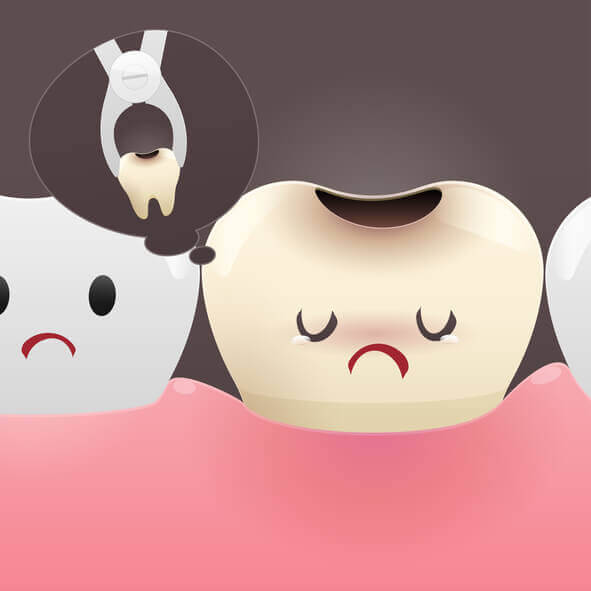Undergoing a tooth extraction — or “having a tooth pulled” — isn’t something that anyone hopes to deal with. However, some experts estimate that over 20 million teeth are extracted every single year in the United States — making a tooth extraction an extremely common procedure. Once all baby teeth are gone and wisdom teeth have grown in, adults should have 32 permanent teeth. There are certain reasons, though, when tooth extraction may be necessary to maintain your oral and even general health.
The Most Common Reasons for a Tooth Extraction
In a tooth extraction procedure, a tooth is removed from its socket in the bone. With new advanced surgical procedures available, this entire process can be quick and relatively pain-free. Here are some common reasons for getting a tooth extraction:
Damaged Tooth
Teeth usually become damaged for 1 of 2 reasons — a trauma has occurred (some sort of accident), or a progressive disease has worn away healthy teeth and gum. For example, advanced gum disease can wear away tissue and bone until a tooth becomes dangerously loose.
To Make Space
Sometimes, our mouths just aren’t big enough to fit all of our teeth. Before undergoing an orthodontic procedure like braces, teeth may need to be pulled to reduce overcrowding and make room for the remaining teeth to spread out and straighten. Space may also be an issue when someone has extra teeth or wisdom teeth and doesn’t have enough room for them to comfortably grow in.
Chemotherapy
Chemotherapy drugs for cancer treatment are known to weaken the immune system. If any teeth are even slightly infected, a doctor may recommend having them extracted to prevent the infection from spreading or becoming more serious.
Radiation
Before undergoing head or neck radiation therapy, patients may need teeth extracted. Abscessed teeth or teeth affected by gum disease may need to be removed so as not to jeopardize treatment options or delay recovery.
Organ Transplant
Organ transplant patients are given medication that can negatively affect the immune system, which puts them at a higher risk of infection. Any teeth that are infected or are on the verge of infection are usually removed to avoid any health problems down the road.
Teeth that are Misaligned
If your teeth are misaligned and there are certain teeth that have nothing to bite against (another tooth), your doctor may recommend having that tooth extracted to avoid future issues with your oral health.
Microsurgery for Tooth Extraction in Manhattan
Advances in modern dentistry have made tooth extraction something that does not need to be feared. In his Manhattan office, board-certified periodontist Dr. Scott O. Kissel employs microsurgical techniques for tooth removal, which includes magnification, illumination, smaller instruments, and Piezosurgery technology (which is atraumatic to hard tissue and leaves soft tissue untouched). Microsurgery allows for greater comfort during and after surgery, a faster recovery, less need for sedation, and an approach that doesn’t cause trauma to the adjacent bone, gum, and teeth.
Let a specialist handle your tooth removal and experience the difference microsurgical techniques can make. Contact the Manhattan office of Dr. Kissel to schedule a consultation by calling Dr. Kissel’s office in New York City for a consultation at (212) 702-9088 or book online.
